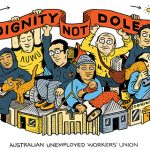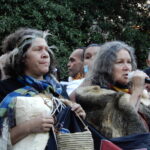Protecting Civil and Digital Liberties: An Interview With the Pirate Party’s Sara Joyce

Australia is the only democratic country in the world not to have a national bill of rights. This effectively means that citizens’ human rights and civil liberties aren’t protected under the nation’s laws.
The Australian Constitution provides a couple of safeguards. Section 41 ensures that citizens have the right to vote. Section 51 maintains that a person has the right to fair compensation if government acquires their property. And the right to a trial by jury is enshrined under section 80.
While someone really ought to make Scott Morrison is aware that section 116 safeguards freedom of religion, as then we’d all be able to forget about his little crusade.
However, what this lack of protection means though, is many of the rights we – as Australians – take for granted, aren’t guaranteed under the law. This includes the right to privacy, freedom of speech, equality before the law and peaceful assembly.
And as we head towards a federal election, the two major parties vying for office have persistently failed to enact rights protecting legislation. And that’s why the Pirate Party are running for the Senate with the promise of introducing such a bill as a key priority.
An assault on liberties
No rights protections under federal law means successive governments have been able to legislate to incrementally erode citizens’ civil liberties under the pretext of national security and counterterrorism.
While a bill of rights could establish a system where the judiciary would be charged with assessing laws to ensure that they don’t impinge on citizens’ basic freedoms, the system we now have involves both Liberal and Labor MPs signing off on bills that provide them with greater power.
In the last year alone, national security bills were passed with bipartisan support that saw the establishment of espionage laws that silence criticism of government, sabotage offences that curb protests and provisions that allow government access to private encrypted messages.
The Pirate Party candidates running in the election are well-aware that our civil liberties have long been under threat. And if elected, they aim to prevent the further erosion of these freedoms and ensure government is more accountable.
The piracy of government
The Pirate Party also has a focus on the protection of digital rights. As number two candidate on the Pirate ticket Sara Joyce asserts, with the increasing importance of the digital realm in our daily lives, so too has encroaching upon our rights online become a rising preoccupation of government.
Indeed, as Australia is part of the Five Eyes data sharing nations, it doesn’t matter which party is in power, as both answer to the covert international alliance, which has the aim of surveilling all reaches of the internet. That’s what Dutton’s Assistance and Access Bill was all about.
Sydney Criminal Lawyers spoke to the Pirate Party’s Sara Joyce about how the protection of both civil and digital liberties is crucial, why Australians are turning to minor parties in droves and the dire need for greater government transparency.
Firstly, the Abbott government was elected into office in September 2013. And as we head to the ballot boxes this weekend, we’re staring down the barrel of almost six years under a Liberal Nationals government.
Sara, how would you say the nation has fared under more than half a decade of the Coalition?
Well, very badly. Almost immediately, Tony Abbott had the gall to name himself minister for women. Then he gutted social, women’s and Indigenous programs, and put a curb on civil liberties. He was the laughing stock of the nation.
When Malcolm Turnbull was prime minister, he put a smidgen of the money back into the programs, as long as the government got to dictate the agendas. And they had little to no engagement with the communities they were pretending to support.
And they did that in such a way to say, “Look at all the money we’re putting into these social programs.” For instance, they put a million back into fighting domestic violence against women. But, they’d actually taken out three million before that.
They gutted funding for education. They botched the NBN, which will probably have to be rebuilt in the next couple of years. The Coalition doubled the debt, and still pretend they’re fiscally responsible. And they’ve been spending money offshore on submarines and jet fighters that are obsolete.
And then there’s Scomo: the guy I like to call the absent prime minister. Whenever there’s anything regarding social change, support for civil or digital liberties, or Manus and Nauru, he’s nowhere to be found.
But, when there’s a big infrastructure gig – a building or a bridge – and an opportunity to promise heaps of money to pander to his right-wing Christian base, he heads out into some opportune location to promote it.
Seriously, the Liberal Party needs to go.
During the election campaign, social media platforms have been awash with Australians calling on their fellow voters to avoid the major parties.
Why do you think there’s such a move towards the minor parties this time round? And why should people choose the Pirate Party over others?
People are sick of the same old arguments. And social media is a relatively level playing field, unlike the mainstream media, which chooses to focus on the LNP, Labor, the Greens and the rich right-wing crazies.
If you have a bit of knowledge about digital media, you can get your message out. But, still, it only represents a portion of the community who vote.
So, you need to get out there and talk to people. Forget the cameras. Forget the nonsense. And listen to what people have to say and build your own strategies around that.
Social media is still only one of the tools to get the message out. But, again, it’s levelling the playing field when it comes to alternative parties.
The left-wing progressives – one of which is the Pirate Party – have some great policies. What makes the Pirate Party unique is we’ve spent the last decade working on our policies. And I challenge you to find another party with as many policies online that are as fleshed out.
We know for a fact that members of the Greens and the Labor Party have from time to time used our policies as a reference for their work. And we’re happy to share the love, but it would be nice if we got a bit of that back.
Some website recently reported that we’re an offshoot of the Labor Party. But, if that were true, I would have a lot more money for my campaign.
In fact, this campaign has cost me everything. I’m currently running on zero dollars. So, that’s how passionate we are.
We’ve had some support, in terms of the applications for our eight candidates. But, we’re mostly running this campaign off our own backs. So, if that’s not dedication for supporting the idea of better government by putting everything on the line, then I don’t know what is.
We also stand apart in talking about the right to repair – from cars to electronics. So, people who have the knowledge should have the right to repair when they’ve purchased equipment, instead of adding to waste, and ultimately, adding to the problems of climate disaster.
One of the issues front and centre for your party is defending digital rights. A lot of Australians mightn’t be concerned about such matters. But, as someone who’s aware of encroachments in the digital realm, why should people be concerned about their online freedoms?
We stand apart on things like digital liberties. People might not think they’re important. But, it includes things like the government being allowed to snatch money from your bank account without your knowledge, or reporting on everything you do online, or when you travel on the train with your Opal Card and hundreds of agencies have access to that data.
These things are important. And they can be used against you if you’re having financial difficulties, or in the case of China, this technology can determine your social status in a database. So, that’s kind of where we’re heading.
At the end of last year, the Greens and Labor rushed through their support for the Assistance and Access Bill, which sacrificed a good portion of our digital liberties. This is something the Liberal Party has been trying to do for decades.
This was done, so Labor and the Greens could then raise the bill regarding Manus and Nauru, which never ended up happening, because the LNP pissed off from work early, yet again leaving refugees in limbo.
So, the Pirate Party has taken the stance that it’s unacceptable to sacrifice our privacy, either online or otherwise.
Another key Pirate issue is civil liberties. Since 9/11, the federal government has passed over 70 pieces of national security/counterterrorism legislation that have encroached on citizens’ freedoms. And at the state level, successive governments have been doing the same.
What state would you say personal freedoms are in today after two decades of government legislating for tighter controls?
It’s obvious that they’re nothing like they used to be. I talk to a lot of activists, who were protesting back in the day. And they talk about how difficult it is just to do a protest.
Once, you could hold a protest, and as a courtesy, you could call the police and tell them you were having a protest. Now you get fined for all sorts of reasons. And I’ve been involved in protests with the Teachers Federation, and we got fined almost every time we went outside.
You can also go to gaol these days for 10 years for reporting corruption in the government. That’s just ridiculous.
The tighter things are getting in this country, the less of a democracy we have, and the greater the social class divide is becoming. The middle class is being evaporated. And soon there will only be the poor and the rich. And the next time somebody has a protest, the police will start killing civilians.
That’s where we’re heading. We’ve seen it throughout history. Our freedoms have slowly been taken away. And it’s a bit less noticeable, since it only happens once every two years.
The Pirate Party advocates for the establishment of an Australian bill of rights. What sort of a difference would such a bill make in this country?
A bill of rights will help protect the right to protest against government, as well as protect the rights of journalists to report on corruption.
We have a constitution, but it has no teeth without a bill of rights. We constantly hear about people’s rights being protected in the United States, but we don’t have that here.
One of the key things over there is the First Amendment: “Congress shall make no law respecting an establishment of religion, or prohibiting the free exercise thereof, or abridging the freedom of speech, or of the press, or the right of the people peaceably to assemble, and to petition the government for a redress of grievances.”
A big portion of our civil liberties would be addressed in that one amendment.
The First Nations peoples of this continent are continuing to face huge injustices after 230 years under a British-created government.
They’re the most heavily incarcerated people on Earth, deaths in custody are routine and unprecedented numbers of Indigenous children are being removed from their families.
Where does the Pirate Party stand on First Nations issues?
The Pirate Party has a policy on making the conversation around treaty more transparent. And having a better discussion about how we achieve that together.
We also have a policy of recognition of Aboriginal and Torres Strait Islander people prohibiting racial discrimination.
It’s disgusting that we are the only Commonwealth nation without a treaty with its Indigenous population. I’ve been working hard over the years to help bridge the gap between First Peoples and everyone else.
I’ve done a lot of work with advocacy groups. I spent a lot of time at the Teachers Federation working with the Aboriginal coordinator and working with Indigenous communities in the digital media space.
It’s really going to take all of us in the community to work together to change this. And people have to realise that we weren’t here first.
The First Peoples have been here 60,000 plus years. You have to respect that it’s the oldest living culture on Earth. And we should be treasuring it.
Sara, you’re a trans woman. How much of a political issue would you say gender diversity is, as opposed to being just a social issue? And how do the rights of gender diverse people need to be prioritised?
First of all, it would be an incredible honour to serve as the first trans woman in the Senate. Although, I try not to let that define me or my politics so much.
But, of course, I support the LGBTI community. And I would like to see more support services for gender diverse people around the country. Currently, the services available are woefully inadequate. And I know, because I have dealt with them in the past.
In the media, they tend to focus on issues like Safe Schools. They always grab people like Cate McGregor. And you don’t really hear about a lot of the trans issues that need to be dealt with.
People out there still see us as dancing-in-a-club-type trans people. And that’s just not the reality of who we are. And doctors, and even some endocrinologists, are mostly uneducated when it comes to trans issues. But, they’ve been learning it in a sense.
People have found it more socially acceptable to be who they are. Still, there’s a lot of violence directed towards trans people, in particular. And I’ve been on the receiving end of that.
I’ve been transitioning for five years, after spending half my life holding back. And there’s a lot we have to do to make this a better place for gender diverse people.
One thing is eradicating religious hatred and bigotry for trans people, because they’re the ones going out and marching against marriage equality and saying trans people aren’t real.
Those are the sort of issues that I would want to bring up to keep the conversation going.
Where do I see it as being important in terms of the scale of other things? It needs to take a backseat to things like climate change and First Peoples issues. But, still, it’s an important issue to me.
And lastly, we’ve covered a lot of ground here. But, if you’re elected into the Senate, what are some of the other key areas you’d be prioritising on behalf of the Australian public?
If elected, I would strongly support any bill that adequately tackles climate change. I would support a disaster relief fund for our farmers. And a lot of people have spoken to me about Royal Commissions into various issues.
I would always try and represent the people when voting, as opposed to sacrificing any bill for the sake of getting another one up. I would expose any of that backdoor dealing to the public.
And I would do my very best to make government more transparent. That’s one of our key focuses to make the government more transparent.
Anyone hiding secrets that are to the detriment of the Australian people, they just better watch out.







